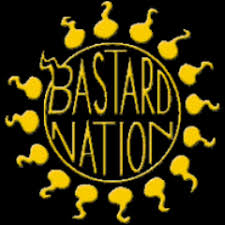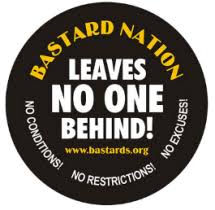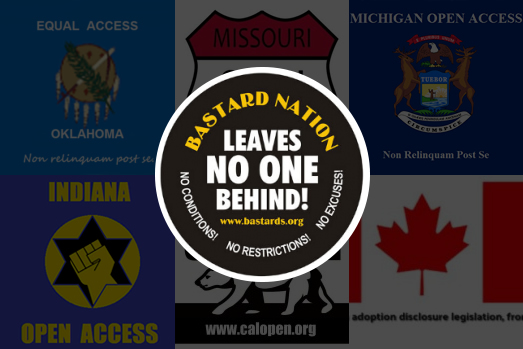The Adoptee Rights Organization
Bastard Nation History, Analysis, and Endorsement
of Citizenship, Deportation
and
The Adoptee Citizenship Act of 2019-2020
Short Version
September 9, 2020
(Revised and updated from 2015 document)
This report will be updated when appropriate.
The long version of this report is here
Until 2000 children adopted internationally by US citizens were required to undergo a naturalization process prescribed by US law. Depending on the type of visa the child traveled under to enter the US, some were granted automatic citizenship while others gained citizenship only after their adoptive parents “re-adopted” them in the US following procedures outlined by federal and individual state law.
Unfortunately, many adoptive parents did not research or verify citizenship status at the time of adoption or follow through on the citizenship process. Some say they were unaware of naturalization requirements and believed citizenship was automatic upon adoption finalization. Some claim to have been misled about citizenship procedures by their adoption agencies, courts, lawyers, or federal immigration authorities. Some believed that it was up to the adoptee, at the age of majority, to choose their citizenship status. In some cases adoptive parents disrupted the adoption, and either “rehomed” the children they brought to the US or turned them over to the state foster care system where they lingered with no legal closure.
Decades later these misunderstandings and failures led to legal problems—including deportation proceedings– for international adoptees years after their adoptions were assumed “finalized” and citizenship granted. Most of these adoptees had no idea that they were not US citizens until they attempted something as simple as registering to vote or were convicted of minor crimes—even misdemeanors—and fell under the gaze of government authorities.
The passage of the federal Child Citizenship Act of 2000 (text) (CCA) attempted to remedy this situation by granting automatic citizenship to those born on or after February 27, 1983, the effective date of the legislation.
Those adopted before that date were left behind, subject to federal investigation and possible deportation under the old system. The situation became worse after 9/11 when legal identity and proof of citizenship came under critical scrutiny by federal, state, and local governments. Since then, the number of international adoptees deported or in the deportation pipeline has grown dramatically Most, before and after 2000 have been convicted of minor non-violent offenses particularly controlled substance possession; others reportedly investigated and threatened with deportation for simply applying for a Pell Grant or Social Security benefits. One absurd pre-2000 case involved German adoptee, Mary Anne Gehris, an administrative assistant and mother of two in Covington, Georgia, who in 1998 applied for citizenship so she could vote and accept scholarship money. She admitted on her application that ten years earlier she had been convicted of misdemeanor battery for pulling a woman’s hair during a “spat” over a boyfriend, and had done a year’s probation, and community service. She avoided deportation when the Georgia Board of Pardons and Parole granted her a pardon to keep her in the US. She became a US citizen in 2001. Under today’s Draconian legal procedures she would likely be deported.
The federal government keeps no statistics on the number of adoptees who have been deported or how many adoptees are in the US without US citizenship. We are therefore forced to rely on media reports on individual deportation cases or activist-researchers also hampered by poor official statistic keeping. The most complete documentation is located on the website of the adoption watchdog Pound Pup Legacy. Other stories are collected on adoptee citizenship activist web pages run by the Adoptee Rights Campaign and Adoptees for Justice. A general article on Korean adoptee deportation can be found on Wiki. Some researchers believe that the number of “illegal adoptees” in the US is about 15,000. but the number could go as high as 35,000. according to activists. Many probably are not aware of their “illegal” status and some may not even know that they are adopted. To make matters worse, those who learn they aren’t citizens are fearful of coming forward to apply for citizenship because under the Immigration and Nationality Act of 1996 they can be charged as undocumented by INS/ICE and subject to deportation. The law gives judges little discretion to stay deportations.
Currently, America’s “illegal adoptees” cannot gain permanent resident status. They cannot legally hold jobs or driver licenses or register vehicles, open bank accounts, join the military, receive security clearances, apply for US passports, or receive any number of government entitlements or funds—including Social Security that they or their spouses have contributed to and are eligible to collect.
Adoptee deportees have little or no memory of their countries of origin. They have no native-language skills and no family, friends, or support system in their first countries. Most have no means of employment in their original countries due not only to those limitations but because those governments severed citizenship when the child was adopted to the US. News reports indicate that deported adoptees often end up in homeless shelters and the streets—or worse– when returned to their countries of origin.
What we do know is that the majority of adoptee deportees are Asian and Latinix, most adopted as infants or toddlers by white parents, some military. Some deportees, are US military veterans whose status wasn’t flagged when they enlisted in the military. A number of deportees are victims of child physical and sexual abuse, disrupted adoptions,, re-homing, and abusive foster care.
Legislation
Since the passage of CCA 2000 three attempts have been made to close the pre-2000 “loophole,” but have met with resistance even by members of Congress who “get it.” A major stumbling block has been a concern over a “pathway to citizenship” for those convicted of crimes and deported to their country of origin. The bills are a hard-sell with adoptee citizenship being conflated with immigration controversies. Reportedly. some conservative legislators who actually supported earlier attempts to amend the ACA are hesitant to step forward for fear of being perceived as ‘pro-immigration.”An amended, inclusive ACA they say, can be the camel’s nose under the tent regarding immigration loopholes even though international adoption is not an immigration issue and is, in fact, deeply promoted by US foreign policy. In general, then, international adoption has been caught in the crosshairs of current and proposed immigration policy and controversy now more than ever under the Trump -Stephen Miller regime.
- In 2015 US. Sens. Amy Klobuchar, (D-Minnesota), and Jeff Merkley, (D-Oregon) introduced S2275, The Adoptee Citizenship Act of 2015/2016 (ACA) an amendment to the Child Citizenship Act of 2000. Rep. Adam Smith (D-Washington) introduced HB 5454, the companion bill in the House. The bill retroactively granted citizenship to nearly all adoptees who did not fall under the original CCA law. Exceptions were made for those whose criminal charges had not been resolved. The bills had little support and died in committee without hearings.
- HR.5233/S.2522: The Adoptee Citizenship Act of 2018 was a rehash of the 2015/16 bills. Passage would have granted citizenship for international adoptees born prior to February 27, 1983, except those deported due to conviction of crimes of physical force against another person. They, too, died in committee without hearings
- Currently,H.R. 2731/S.1554. (ACA 2019-2020) are running in both houses. Introduced in May 2019, the proposals enjoy non-partisan support. They cover international adoptees who lawfully entered the US, but did not meet the age restriction of the current law. They apply to nearly all those who have been deported or are residing in another country on the effective date of the bills, and whose criminal cases have been resolved pursuant to appropriate legal authorities. The House version is in the Subcommittee on Immigration and Border Security. The Senate version is in the Judiciary Committee. No hearings are scheduled, but support has picked up over the years. As of this writing, the House bill sponsored by Rep. Adam Smith (D-WA) has 61 co-sponsors; the companion Senate bill, sponsored by Sen. Roy Blunt (R-MO), and has 8 co-sponsors.
Bastard Nation Believes
Bastard Nation supports the Adoptee Citizenship Act 2019/2020, the amendment to the Child Citizenship Act of 2000. We believe:
- All adoptees, adopted domestically and internationally, should be treated equal and fair under law.
- All individuals adopted by US citizens should enjoy the same citizenship rights and responsibilities as American-born individuals. Their finalized adoption makes internationally adopted individuals the legal children of their American and legal adoptive parents.
- No one adopted by a US citizen in a cross-country adoption should be denied US citizenship due to their date of adoption. Under the current segregated system (mirrored in most states by OBC access regulations) some adult adoptees enjoy full citizenship rights and responsibilities, while others are forced to either hide their status and live in fear or come forward, undergo cumbersome and unnecessary citizenship requirements and paperwork—and possibly set themselves up for investigation and under certain circumstances deportation to their country of origin—to enjoy those same rights and responsibilities.
- Adoptees were entitled to citizenship before their crimes or other miscues were committed. Commission or conviction of a crime does not supersede their adoption.
- International child adoption is not an immigration issue.
- US international adoptees had no say regarding their adoption and entry to the US. Their adoptions were facilitated by a network of adoption providers, professionals and US government agencies including the US State Department. They lack US citizenship through no fault of their own and should not be punished due to the negligence and lack of due diligence on the part of their adoptive parents, adoption professionals, or US immigration authorities.
- US international adoptees, should not be kept from grasping their citizenship rights due to fear of federal immigration retaliation if they come forward and attempt to apply for citizenship.
- The US, as a signatory to the Hague Convention on Intercountry Adoption, is obligated to extend all rights and privileges to its international adoptees.
- The deportation of adult adoptees controverts the belief that adoption is “forever,” and that adoptees are truly the children of those who adopt them. Deportation gives a black eye to US international adoption policy and sends a strong message to sending countries that adoption is temporary and subject to bureaucratic whim.
- For over 70 years US government policy has encouraged and facilitated cross-country adoption, yet without the protection of ACA, pre-2000 adoptees are disenfranchised from the country and adoption that embraced them.
Support

ACA 2019/20 is endorsed by a wide range of adoptee rights. Adoption reform, adoption advocacy, civic and religious organizations, and private businesses. (This list may be incomplete)
- Adoptee Solidarity Korea – Los Angeles (ASK-LA)
- Adoptee Rights Law Center PLLC
- Adoption Links DC (ALDC)
- Adoption Support Services
- Advancing Justice (Atlanta, Chicago, DC, Los Angeles, San Francisco)
- Also Known As (AKA)
- Asian Adult Adoptees of Washington (AAAW)
- Asian American Bar Association of Houston\Asian Law Alliance
- Bastard Nation: the Adoptee Rights Organization
- Bethany Christian Services
- Boston Korean Adoptees (BKA)
- Chinese Adoptee Links (CAL)
- Chinese for Families
- City of Houston-City Council
- City of Houston- Mayor Sylvester Turner
- Concerned Citizens Coalition
- Council for Christian Colleges and Universities (CCCU), Shirley V. Hoogstra, President
- Council of Korean Americans (CKA)
- Donaldson Adoption Institute
- Evangelical Immigration Table
- 18 Million Rising
- Faith and Community Empowerment, Hyepin Im, President and CEO
- Ford Motor Company
- Friends of Korea
- GA Korean Grocers Association
- Harriet Tubman Center for Justice & Peace, Inc.
- Haydon Street Inn
- Holt International Children’s Services (HICS)
- Houston, Texas Mayor’s Advisory Council Member, Office of New Americans & Immigrant Communities
- Houston Chapter of Korean Sports Association, Texas
- Inter-Community Action Network
- Iowans for International Adoption
- Joynus Care
- Kokua Council of Senior Citizens of Hawaii
- Korean Adoptees of Chicago (KAtCH)
- Korean Adoptees of Hawaii
- Korean Adoptees of Houston, Texas
- Korean American Adoptee Adoptive Family Network (KAAN)
- Korean American Voters League, Houston, Texas
- Korean American Association of Chicago
- Korean American Association of Spokane Area
- Korean American Coalition of Oregon
- Korean American Coalition (National)
- Korean American Community Services
- Korean American Association of Houston, Texas
- Korean American Senior Citizen’s Association, Houston, Texas
- Korean Americans for Political Advancement (KAPA)
- Korean American Resource and Cultural Center (KRCC)
- Korean American Student Association, UIC (KASA)
- Korean-American Women’s Association of Atlanta
- Korean American Women’s Association of Houston, Texas
- Korean American Women in Need (KAN-WIN)
- Korean American Women’s Society
- Korean Churches for Community Development (KCCD)
- Korean Cultural Center of Iowa
- Korean Quarterly
- Korean Resource Center (KRC)
- Korean Society of Oregon
- Korean War Veteran
- Korean Women’s International Network
- Lost Sarees
- Magna Citizen Studio
- MinKwon Center for Community Action
- Mixed Roots Foundation
- National Asian Pacific American Bar Association (NAPABA)
- National Asian Pacific American Women’s Forum (NAPAWF)
- National Association of Evangelicals (NAE), Leith Anderson, President
- National Center on Adoption and Permanency (NCAP)
- National Council For Adoption
- National Council of Asian Pacific Americans (NCAPA)
- National Foster Parent Association (NFPA)
- National Hispanic Christian Leadership Conference (NHCLC), Samuel Rodriguez, President
- National Immigration Forum
- National Peace Corps Association (NPCA)
- New York Immigration Coalition (NYIC)
- North American Council on Adoptable Children (NACAC)
- We Are One America
- Oohjacquelina Handcrafted Jewelry
- Oregon Asian Pacific American Bar Association (OAPABA)
- Pacific Lutheran University
- Pearl S. Buck International
- Praise Clothing LA
- Presentation Sisters Associate
- Research Center for Korean Community at Queens College
- Siri Southwick-Young
- Sister Diaspora for Liberation
- Southern Baptist Convention-Russell Moore, President of Ethics & Religious Liberty Commission
- Truth and Reconciliation for the Adoption Community of Korea, (TRACK)
- Wesleyan Church
- University of Advancing Technology
- You Gotta Believe.org
- Washington Immigration Defense Group
- Wesleyan Church, Jo Anne Lyon, Global Ambassador
- World Hug Foundation, NY
- World Relief, Scott Arbeiter, President
Selected Resources
-
-
- US House of Representatives Directory
- US Senate Directory
- Sample State Resolution – Illinois
- Adoptee Rights Campaign
- Adoptee Rights Campaign – Facebook
- Adoptees for Justice
- Adoptees for Justice – Facebook
- Adoptee Rights Law Center
- ACT: Against Child Trafficking
- ACT: Against Child trafficking – Facebook
- Pound Pup Legacy Deportation Cases
-
Written by Marley Greiner with assistance from Shea Grimm
Published July 1, 2016; Revised September 9, 2020
©2016, 2020 Bastard Nation: The Adoptee Rights Organization
_____________________
Bastard Nation: the Adoptee Rights Organization
PO Box 4607
New Windsor, New York 12553-7845
bastards.org 614-795-6819 @BastardsUnite






